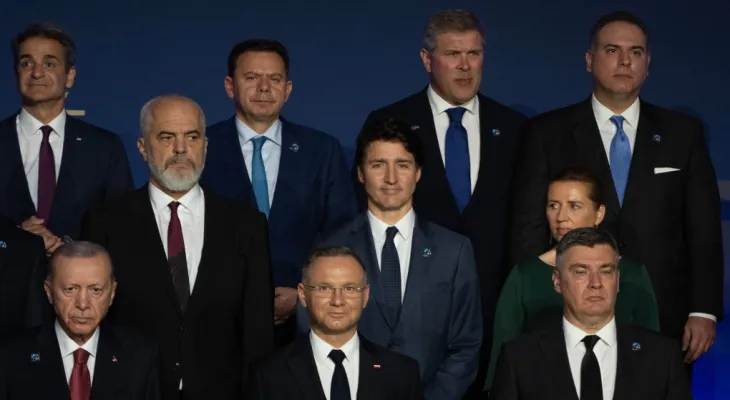Search here
Newspaper
Search here

Arab Canada News
News

Published: July 10, 2024
Since his arrival in Washington, D.C., earlier this week, Canadian Prime Minister Justin Trudeau has faced a torrent of criticism regarding his government's lack of a plan to fulfill NATO's commitment to spend 2% of its GDP on defense.
U.S. House Speaker Mike Johnson accused Canada of "riding on America's coattails" during a security forum on the sidelines of the 75th anniversary summit of NATO, a military alliance that Canada helped establish.
Johnson said: “They have the safety and security of being on our borders and they don't have to worry about that. I think that's shameful, if you want to be a member and participate, you must do your part.”
Last place among member states
Of the 32 NATO member countries, there are 23 that meet or exceed the 2% threshold. Canada currently spends 1.37%, placing it fifth from the bottom of the list, ahead of Belgium, Luxembourg, Slovenia, and Spain, according to NATO figures.
At the opening ceremony on Tuesday, NATO Secretary-General Jens Stoltenberg warned members against complacency and said, "2% is not the ceiling, but 2% is now the minimum for our defense spending."
Stoltenberg did not specifically single out Canada, but pressure is mounting on Trudeau to increase military readiness by recruiting more soldiers and producing more weapons and equipment.
The issue of the commitment was also raised during the Prime Minister's meeting with a group of U.S. lawmakers. Earlier, high-ranking government sources told reporters that Trudeau's "Team Canada" meetings would focus on securing supply chains and enhancing business opportunities.
When discussions ended, Senate Minority Leader Mitch McConnell noted in a post on X about shared values and economic relations but said, "It's time for our northern ally to seriously invest in the hard power needed to help maintain prosperity and security across NATO."
Canada and the defense of Ukraine
After the meeting, Trudeau defended his government's record in a keynote address at NATO's Centre of Excellence for Climate and Security.
"When we took office, Canada was spending less than one percent of its GDP on defense each year, but we committed to changing that. And we have followed through on our word."
Trudeau's government plans to spend an additional $73 billion on defense over the next twenty years - if they remain in power.
The Department of National Defence expects that by 2030, Canada will spend 1.76% of GDP on the military - but did not specify when it would reach 2%.
When it comes to collective security, Trudeau and his government often point to Canada's support for Ukraine as an example of how Canada is punching above its weight.
99% of Ukraine's military budget is funded by NATO allies.
Since the Russian invasion in 2022, Canada has contributed $4 billion in military support to Ukraine, and over $12 billion in loan guarantees to keep its economy afloat.
Tensions rise in Poland over support for Ukraine
The Prime Minister is often a strong supporter of Ukrainian President Volodymyr Zelensky at international meetings.
He lost his seat at the table
On Tuesday, just a few buildings away from the Capitol, about 75 Ukrainian Americans gathered at the Holodomor Memorial. They were there to see Zelensky, who laid a bouquet of flowers in remembrance of the millions who starved during the Soviet-era policies.
Paul Grod, a Canadian now serving as president of the Ukrainian World Congress, stated that Trudeau must allocate more resources for military readiness, not just for Ukraine, but for the long-term stability of the alliance.
He added that Russia is at war, and quite frankly, Canada is falling behind by not keeping pace with our allies at least in how we spend on defense."
"We have to appreciate that Canada is a large country with a warring neighbor to the north called Russia."
Roland Paris, an international affairs professor at the University of Ottawa, stated: "We have become one of the most prominent laggards at the back of the group. It is really important for Canada to be a credible ally if we want to be taken seriously at international meetings, and if we want our voice to be heard."
Paris, who also previously served as a senior foreign policy advisor to Trudeau, points out that Canada has been called out by nearly a quarter of U.S. senators on Capitol Hill.
In May, a bipartisan group of U.S. senators sent a letter to Trudeau reminding him that Canada has committed to reaching NATO's spending goal since 2006.
Paris said: "I think this will be a very awkward meeting for Prime Minister Trudeau if Canada does not plan to make additional spending commitments at this summit."
Comments